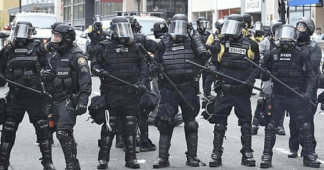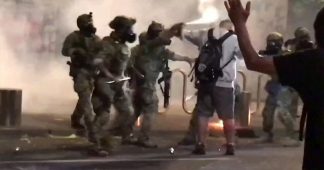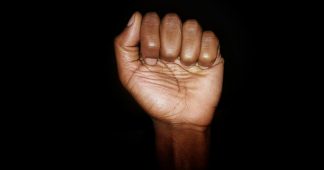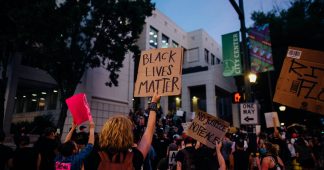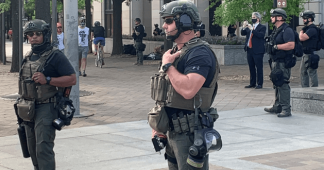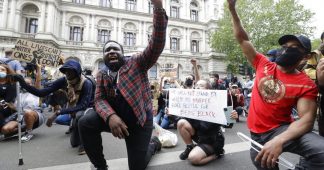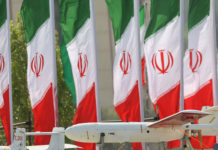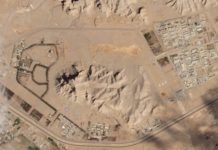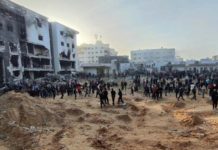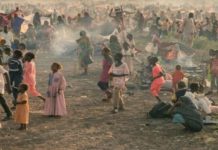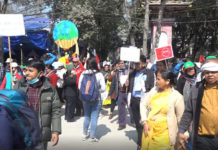By Candice Bernd,
Hundreds of protesters in Washington, D.C., took to the streets even before President Trump prematurely claimed victory and promised a Supreme Court fight early Wednesday morning, as the presidential race remained undetermined, with votes still being tallied in key battleground states.
On Tuesday, hundreds of protesters occupied downtown D.C.’s Black Lives Matter Plaza along a two-block stretch of 16th Street under heavy police presence that included hundreds of Metropolitan Police Department (MPD) officers closely monitoring sprawling dance troops, live music and protest art.
Additionally, President Trump earlier mobilized thousands of federal agents, including an unspecified number of Immigration and Customs Enforcement (ICE) agents, to quell protests in the nation’s capital in a move experts say was a first for a U.S. election. At least 250 National Guardsmen were reported to be on standby.
Organizers in D.C. are planning more demonstrations throughout the week. Protests in the city were already ongoing after residents clashed with police and smashed windows following the death October 23 of Karon Hylton as a result of a police chase. Black Lives Matter activists centered Hylton’s death at the Plaza and in the streets on Tuesday.
Protesters and the public, though, can’t get anywhere near the White House: Federal agents erected a “non-scalable” fence around the White House that also encompasses Lafayette Square and The Ellipse. Dozens of businesses in downtown D.C. boarded up storefront windows Tuesday in anticipation of election-related unrest that has so far not materialized
Still, agents from ICE, the Federal Protective Service, and Customs and Border Protection were prepped to “protect federal property” in the District. The agents are part of the recently created Trump paramilitary force dubbed the “Protecting American Communities Task Force” that also includes Border Patrol Tactical Unit agents deployed in Portland, Oregon, over the summer. On top of that, The Daily Beast reported that more than 100 personnel from the Justice Department’s Bureau of Prisons as well as others from the U.S. Marshals Service have also been mobilized.
Meanwhile, MPD has restricted officers’ time off and spent more than $100,000 on chemical irritants and other riot-control munitions after much of the agency’s stockpile was depleted during the city’s uprisings this summer. In downtown, streets were closed and parking was restricted. Wednesday morning’s march remained largely peaceful, however, without federal forces and riot-control munitions deployed against demonstrators.
Shutdown DC, working in coalition with dozens of D.C.-based progressive organizations, organized the eight-hour-long event at Black Lives Matter Plaza, calling on area activists to gather there after voting on Tuesday and to be prepared to mobilize if Trump refused to accept election results.
“We have an opportunity to control the narrative and to tell the story of the people who are doing the work and celebrate each other, and celebrate ourselves at the same time,” said LaDon Love, executive director of SPACEs in Action who also works with Shutdown DC.
The group trained more than 1,000 activists in “street smarts” and direct action in advance of Election Day and is working with a D.C. medic collective to address the health and safety needs of protesters last night and throughout the week. The group said it is well prepared for MPD’s potential use of chemical weapons as well as looking after protesters occupying the streets in frigid temperatures for hours on end
“We think that it’s important to start this phase of the election season and our kind of movement moment in the streets,” said Patrick Young, an organizer with Shutdown DC. “We didn’t want to have a situation where we were sitting at home, waiting for some line to be crossed, waiting for something to happen and then a little unclear on how we blow the whistle and get in the streets and what that looks like, so we said, ‘We’re going to start in the streets.’”
In June, at the height of the national uprising over police-perpetrated violence and killings, the president amassed a military force that included teams of local and federal law enforcement as well as active-duty military police. Since then, organizers say they have seen a heightened level of police repression in the city.
“Definitely there is much more of a hands-on policing presence, but it’s impossible to tell whether that is a continued retaliation for a summer-long campaign to defund the police, or it’s [related to the election],” Young told Truthout in the run-up to this week.
Shutdown DC formed in 2019 after climate activists shut down traffic in the District with blockades at key intersections during the youth climate strikes that year. Young and other organizers told Truthout those same tactics are not off the table in the coming days, depending on what the president’s next move is.
The organization has also been participating in simulations of different election night scenarios to prepare for this moment, as well as circulating a popular guide to “Stopping the Coup.” Young and other Shutdown DC organizers are looking at the weeks ahead in three distinct phases: Last night was the first phase.
During the second phase, which begins today, Young said area activists were prepared to do “whatever it takes to respond to attacks on democracy,” telling Truthout that various affinity groups are coming up with different scenarios of plans, such as blocking entrances to the White House or gridlocking morning rush hour traffic. Groups plan to meet today at Union Station to kick things off.
“We’re imaging actions that can be scaled up or scaled back,” Young says. “So it’s like, ‘Yeah, we’re planning on having a dance party in the street Thursday night hypothetically. I don’t know if that’s what will come up, but if we’re facing a coup, that dance party becomes on the beltway, not kind of going down relatively empty streets.”
The third phase, as organizers see it, starts next week when Congress is scheduled to come back into D.C. In a scenario in which there is no clear presidential outcome at that time, area activists will then focus on pressuring lawmakers to refrain from passing new legislation until every vote in their states is counted. If necessary, organizers say, activists must work to disrupt lawmakers at the airports and train stations or try to stop Congress from operating entirely
If there is a clear presidential outcome by that time, area activists should shift to pressuring Congress to pass a new round of coronavirus relief. “We can kind of pivot based on the moment that we’re in,” Young says.
“We all need to be vigilant, and we need to know it’s not a done deal until it’s a done deal,” SPACEs in Action’s Love said. “Voting is really important, but that’s not the end of it. There’s a lot more work that needs to be done in the days that follow.”
Published at truthout.org
